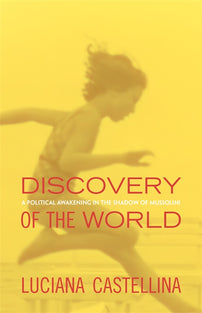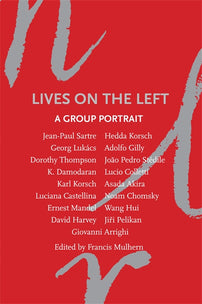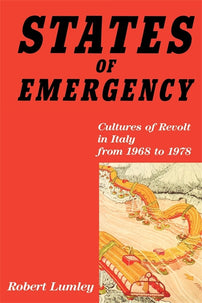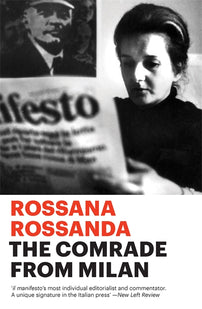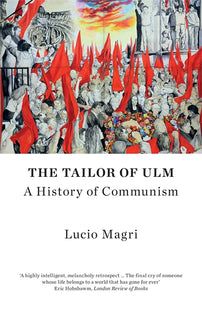The Broken Bones of Democracy: A Conversation with Luciana Castellina
In this wide-ranging interview, Castellina addresses the Italian elections, the past and future of the communist left, and contemporary struggles of workers and women.

First published in L'Espresso. Translated by David Broder.
Already way back in 1943, when she was barely fourteen, it was clear that she had extraordinary pluck. Just after 8 September [the German invasion of Italy] she buttonholed two Wehrmacht officers and hissed at them: "You have to go." She, a girl from Rome’s smart Parioli neighbourhood, where she still lives, went to school with the Duce’s daughter Anna Maria, with whom she played at Benito Mussolini’s state residence. And then came the fatal encounter with communism, a case of love at first sight, destined to go on forever. She signed up to the Party in 1947 and had her apprenticeship with the proletariat in the borgate slum districts on the periphery of Rome. The Communist Party headquarters and the Liceo Tasso school, the Communist Youth, and the law degree at La Sapienza university. The factories, the working class, the class struggle, the freedom that is "either substantial, shared, for everyone, or else counts for hardly anything."
Her stentorian, natural, dazzling beauty, which stirred the comrades more than the best speech by "the Best," Palmiro Togliatti, and which endures still today, now that she is almost 89 but projects charm and energy as if she were 30 or 40. Her marriage with Alfredo Reichlin and her tireless journeys to the Soviet Union, East Germany, the nations in revolutionary tumult or faced with a coup d’état. Politics and journalism stubbornly remaining at the forefront. Founding il manifesto together with Lucio Magri, Valentino Parlato, Rossana Rossanda, Luigi Pintor, and Aldo Natoli. The critiques, from the left, of a Communist Party of overly Brezhnevite hues, and then being pushed out of the party in 1969. The books, her experiences as a parliamentarian and member of the European parliament for PdUP and the emerging Rifondazione Comunista, and the 37 votes she took [only MPs and Senators vote] in the first round of the election for the President of the Republic in 2015.
Our meeting with Luciana Castellina, an extraordinary woman and a diehard intellectual, among the last great civil and moral authorities on the Left, took place in Pescara, in the wings of an Arci [social association] meeting on the hundredth anniversary of the October Revolution. We are struck by how affable and how modern she is, by her unshakeable charm, her modesty. Her constant desire to bet on politics, on the happiness to come, to some sort of sol dell’avvenire [the radiant future society, the "sun of the future"] even half-a-century after ’68. The fact that even now, without fail, she carries "the Vietnam within."
Luciana, the Left has come out of these elections in bits. Did you expect this?
Yes, but it went worse than I had imagined. But what has crumbled is not the Left: democracy itself has had its bones broken. Democracy is not just a matter of communication and the search for support, like the attempt to push up TV ratings, where I look to see if thirty percent of people are against immigrants and then take that line (any implied reference to the Five Star Movement is entirely coincidental…). Politics has to be a matter of building meaning, an idea, a project for society, and it has to involve the people’s participation, for the electorate can only be oriented by way of real engagement, a debate, a selection of the people who will represent you on the basis of the experiences that they have developed on the ground. That is where we build confidence, the capacity for representation, and all that will produce pernicious results whenever it is missing. Democracy based on one vote every five years is not a real democracy. It is a kind of farce. The way is long, but I remain an optimist of the will.
Do you think the Partito Democratico can recover its strength? And if so, how?
The Left has, indeed, suffered from the ambiguity of a party — the Partito Democratico — that defined itself as being on the Left though it has long been practising a right-wing policy. This ended up confusing everyone.
Did you also expect Liberi e Uguali’s flop?
I thought that Liberi e Uguali was a political subject worth betting on, because the fact that their entire leadership group of the old Communist Party, the so-called Firm (even though it was, of course, also responsible for opening the way to Renzi…) came out of the Partito Democratico and criticised all its work in government, represented something important and radical, a tremor, which called for critical reflection. Moreover, Liberi e Uguali’s programme was the exact opposite of the Partito Democratico’s: on the Jobs Act, on immigrants, on schooling, on everything. I thought that the old body of the ex-Communist Party could wake up again. But no, I was mistaken, for that body is now defunct and, in any case, no longer had any confidence. It voted for the Five Star Movement, in order to kick the old system.
Is there some new politician on the Italian Left worth betting on, for the future?
As soon as we speak of some leader who is called-on to redeem the Left, that means that they are not left-wing. Leaderism is populism, and you should steer clear of it as soon as it appears on the horizon. Certainly, in the past there were very prestigious communist leaders, but they became that on account of their capacity to build a mass political subjectivity, not because they went on the TV dressed up as popular leaders.
Is Renzism dead and buried, or could it return? Was it an "infantile disorder of post-communism"?
Renzism did not come along by chance. It is a common tendency that results from globalisation, and from the rhetoric that in the global world we need to hurry everything, that decisions cannot be taken democratically, that voting every five years will suffice. Renzi, with his provincial fiefdom in Rignano, is in this sense similar to Macron, who takes Paris and the whole of France as his own preserve. It is telling that the word that dominates everywhere is governance, which does not mean "government" (which would imply popular sovereignty) but rather concerns the world of bank and company boards. Renzi is the rather idiosyncratic embodiment of this general tendency.
Mala tempora currunt [dark times] for the European Left too, then?
Die Linke in Germany is perhaps the most interesting force. Just like Podemos in Spain (with all its contradictions), and of course the Portuguese Socialists, Corbyn in Britain, and Pope Francis, a revolutionary. The rate of inequality, of barbarism in the world is so high that it is natural that antibodies begin to develop, even if in a very varied way. So it is difficult to imagine a single European Left Party today.
And what about the contemporary labour market? Was it better when we were worse-off, with Fordism?
Everything has changed, globalisation has produced some insane consequences. We cannot allow capital to circulate freely without adopting a common budget policy, common social rights. That is where outsourcing starts from, as in the case of FIAT. Work has profoundly changed. It has fragmented, it has become atomised. Technological transformations have rendered possible the extraordinary possibilities prophesied by Karl Marx. We have reached a point in which human labour counts for ever less, on account of technology, but this is not freeing us from labour, as the German philosopher hoped. Anything but. Unemployment, catastrophic unemployment, is becoming the standard. The inequalities between a few rich and a multitude of the desperate are becoming more acute. If we do not immediately find remedies for this, the gates to a fresh Middle Ages will swing open again. The Left should urgently confront the problem of the recomposition of the workforce, of a subject able to fight collectively.
Do you use social networks? Can they be tools of emancipation, if not of revolution?
They can be something very useful, when you have a web of outside knowledge and limit yourself to using it for your own projects. But if you believe that it can replace real social life, you are heading for disaster. There is this great illusion that the Internet underpins a world of freedom. This is not true. The Web is governed by the richest, by the post powerful. Everyone can speak online, but only the most powerful get listened too.
You were a very oft-pursued woman, in a context (the Communist Party) dominated by men. Have you followed the struggles of the #MeToo movement?
But in the 1950s there were 500,000 women signed up to the Communist Party. It is good whenever any protest comes from us women. But feminism is not saying "men are bad." It means challenging a system that was historically erected by men and not by women. A process that was a little more complicated.
What remains of communism, of being a communist?
The French Revolution created more freedom, but without equality. The Soviet Revolution got rid of freedom in order to realise equality. We are still there, stuck at a crossroads. The problem remains unresolved. But I think that an unequal and iniquitous system like our present one cannot last for long.
[book-strip index="1" style="display"]
